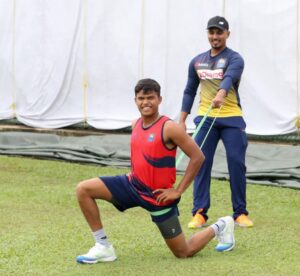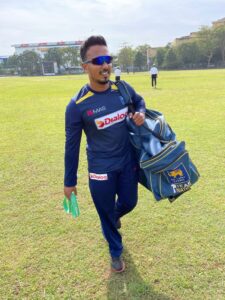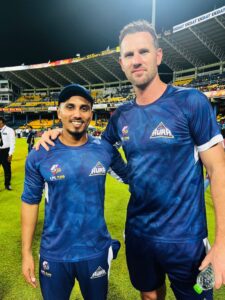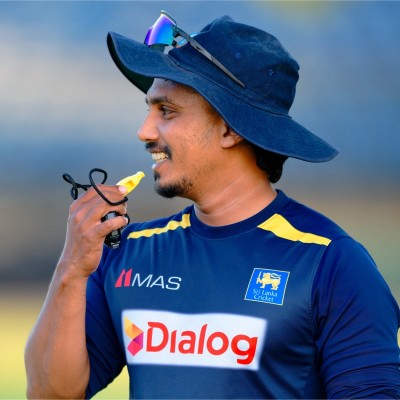Having recently joined Sri Lanka Cricket as Physical Performance Coach, MSc in Performance Coaching student Farnaz Nawaz shares his journey to becoming a coach and working with elite-level athletes.
Transitioning to Coaching
Having always been passionate about his health and fitness, even competing in bodybuilding competitions, Farnaz began a fitness instructor course and gaining experience in a local gym; transitioning from his role in the business world. As his career and reputation grew, he began working with leading cricketers in India. This led him down the path of the ASCA and completing a sports science degree to ensure he was staying up to date in the latest practices.
“I worked for over 5 years in first-class cricket now and joined Sri Lanka cricket last month as a physical performance coach”, he shares.
 Physical Performance Coach at Sri Lanka Cricket
Physical Performance Coach at Sri Lanka Cricket
Having previously worked as a strength and conditioning coach at Sinhalese Sports Club, Farnaz outlines his role with Sri Lanka Cricket.
“I primarily work with the age group pathway programme and under-19 team to ensure the provision of strength and conditioning is delivered in line with the key values of Sri Lanka cricket to enhance the education of young and upcoming cricketers into the culture and behaviours of SLC.”
A typical day in Farnaz’s role involves a diverse range of responsibilities. “I design, facilitate, and deliver the strength and conditioning programme for the pathway group and U19 team based on an athletic development plan. This is done in accordance with the direction of the physical performance manager of Sri Lanka Cricket. I assist and conduct fitness tests to profile the players, in keeping with the physical benchmark for pathway and u-19 cricketers, as identified by the physical performance manager. I also assist the players at the High-Performance Center with their strength and conditioning programme, rehab and coaching and utilise GPS and data management for pathway teams and the u19 national team,” he explained.
In addition to this Farnaz “leads warm-up, pre-game preparation and post-match recovery strategies.” He also “supports the sports medicine team by developing injury reduction strategies and assisting rehabilitation programmes for injured athletes.”
Training Philosophies and Principles
When asked about his coaching philosophy, Farnaz highlights the importance of consistency and work ethic. “My number one coaching philosophy is consistency. I believe that nailing the basics with unbeatable consistency can put you way ahead of many people rather than doing fancy stuff inconsistently.”
Key Milestones and Challenges
Reflecting on his career so far, Farnaz shared some of his key milestones along the way. “There is this one player who debuted for Sri Lanka against England in the Test series a couple of weeks ago. I would say it’s the biggest milestone so far in my career. I worked with him since the beginning of my journey at Sri Lanka first-class cricket. We both put in some genuine work for over 4 years,” he shared. “I have done a couple of international franchise leagues where I worked with some legendary cricketers. And finally, I have reached the dream of working for Sri Lanka Cricket.”

Approach to Reducing Injury Risk and Rehabilitation
When it comes to reducing injury risk and rehabilitation, Farnaz believes in a comprehensive and communicative approach. “I use a global approach for injury risk reduction. We have an athlete management system where we have a centralised database of all the athletes. We have a prehab programme for athletes who have a consistent injury history. We have a well-developed S&C programme to make them resilient and robust. We have weekly compulsory sprints and we use GPS to assist us with load management.”
Studying with Setanta College
Farnaz’s belief in continuous education and development led him to Setanta College where he decided to enrol on the MSc in Performance Coaching. “I had heard so many good things about the programme, it is practical and easily applicable to our daily practice,” he shared as one of the reasons he chose to study with Setanta. “I travel a lot domestically for national tournaments. Attending a class physically and even virtually on a fixed schedule is impossible for me. Setanta was the flexible option.”
Alongside the flexibility, Farnaz highlighted our team of “highly qualified and current academic lecturers” and the up-to-date programme content “which makes [him] a better practitioner” as further reasons to study with Setanta College.
Farnaz has been able to take the knowledge he has learned from the MSc in Performance Coaching and apply it in his coaching career. “From the athlete monitoring and coaching module, many lessons have helped me practically and instantly apply to my day-to-day practices from GPS to Force plate lessons.
Now with the nutrition lesson, I have already started designing a nutrition poster for our boys and I have gone deep into the impact of nutrition on fast bowling and cricket as a whole. I have learned so much.”

Advice for Aspiring Coaches
For young coaches at the beginning of their career, Farnaz offered the below advice:
- “Focus on fundamentals before going to complex things. It has become a norm now.”
- “Continuous professional development and continuous education are two pillars of success.”
- “Don’t copy, build your own coaching philosophy and coaching style.”
Looking ahead, Farnaz has clear goals. “I want to be extremely good at what I do and be one of the best practitioners in cricket,” he said. “I also want to contribute academically, especially in the area of fast bowling, where there is a paucity of research.”


Leave A Comment